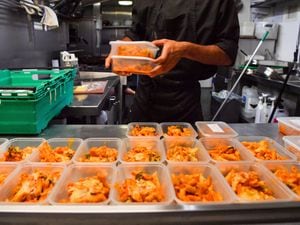Number of children eligible for free school meals surged during the pandemic
More than one in four pupils in the north east of England now qualify for free school meals, figures show.

The number of children eligible for free school meals surged during the coronavirus pandemic, Government data shows.
Figures from the Department for Education (DfE) show that an additional 302,397 pupils have qualified for free school meals since March 23 last year – the start of the first national lockdown.
Nearly one in five (19.7%) pupils in England were eligible for free school meals in October 2020, up from 17.3% in January 2020, the data shows.
This amounts to 1.63 million children, a rise from 1.44 million in January 2020.
Children are entitled to free school meals if their parent or carer is on benefits, including income support or receiving universal credit with household income of less than £7,400 a year.
In total, nearly one in five (19.7%) of pupils were eligible for free school meals in England in October 2020, an increase from 17.3% in January 2020.
The highest rates were in the north east of England, where more than one in four (26.3%) pupils were eligible, and 23.3% in the West Midlands.
In contrast, only 15.1% of pupils in the south east of England were eligible.
The overall percentage of pupils with free school meals had been increasing prior to the pandemic, with increases from 13.6% in January 2018, to 15.4% in January 2019, and to 17.3% in January 2020.
But the increase from January 2020 to October 2020 is higher than each of these previous year on year increases, the analysis suggests.
A Department for Education (DfE) spokesperson said: “It was always likely that more pupils would become eligible for free school meals during the pandemic.
“That’s why we have ensured that throughout this period, schools have continued to accept applications for free school meals, providing meals to anyone who becomes newly eligible, including while pupils were learning remotely.
“We have also committed to extending the Breakfast Clubs programme for disadvantaged pupils over the next two years.
“Outside of term-time, we have expanded our Holiday Activities and Food Programme to every local authority across the country this year, and the Covid Winter Grant Scheme has also been extended over Easter, to further support vulnerable families.”
On Tuesday, the DfE published new guidance to help schools progress their plans for summer schools for children whose education have suffered the most during the pandemic.
It highlighted how children in schools with a large cohort of Free School Meal (FSM) pupils were on average “further behind” with maths and reading than those in schools with fewer FSM pupils.
The guidance says: “Summer school provision with an academic focus has the potential to support attending pupils to make up for some of their missed education.”
Last month, as part of the £1.7 billion “catch-up” package in England, Boris Johnson announced a £200 million fund for secondary schools to deliver summer schools this year.
Schools will be asked to sign up to run summer schools by the end of April, and confirm their plans in June. They will have the flexibility to target the funding to whoever they think would benefit most, but the DfE is encouraging schools to target provision at pupils making the transition into Year 7.
On the guidance, Education Secretary Gavin Williamson said: “It will give local authorities, parents, carers and teachers the notice they need so they can make their summer plans to prepare large numbers of incoming year 7s for their first experience of secondary school, and to make sure the most disadvantaged children can make the most of the school holidays through the Holiday Activities and Food programme.
“I am confident this summer of enrichment and engagement in academic work will be a great success, tailored to local circumstances by their local authorities and also the wonderful heads and teachers who best understand the needs of their students.”





